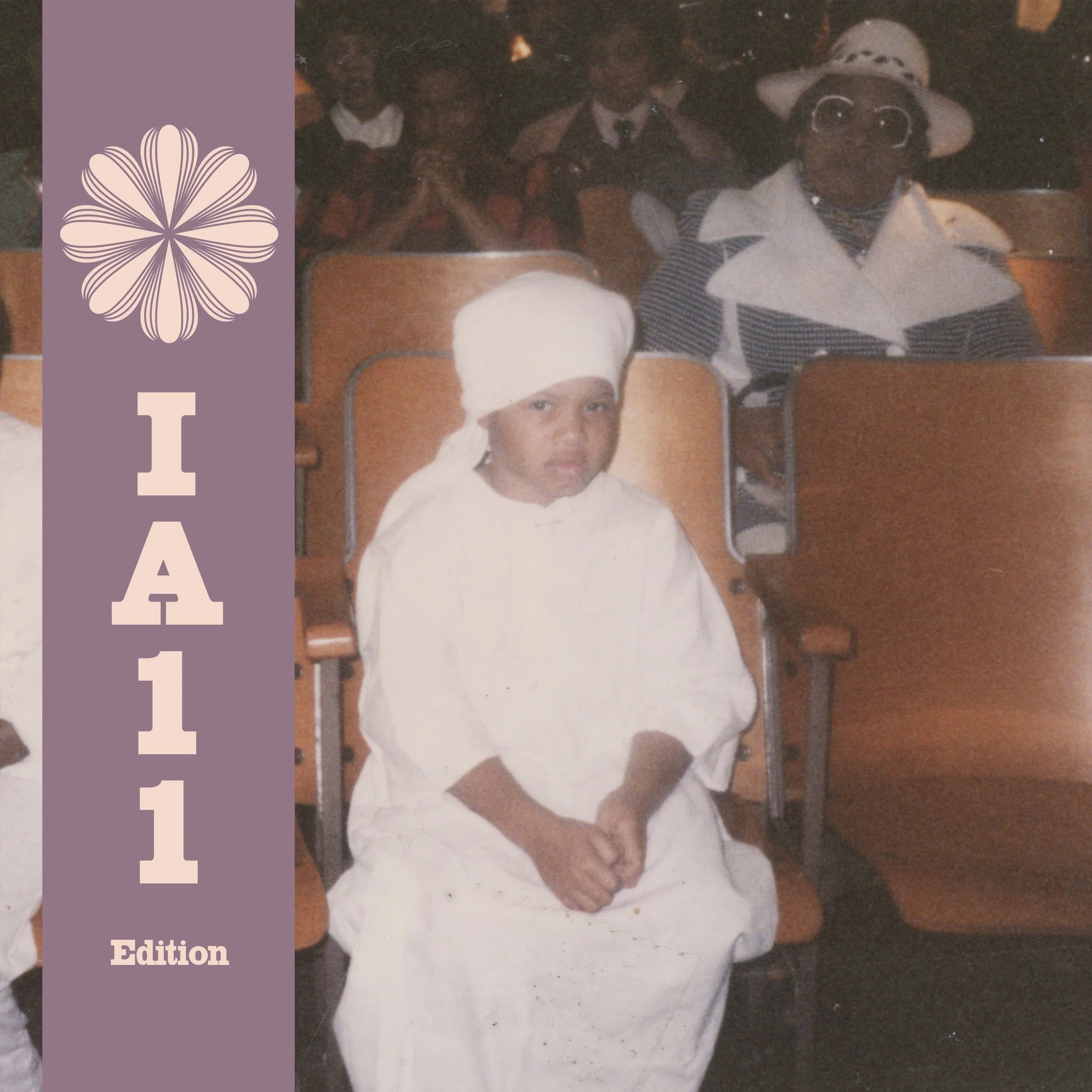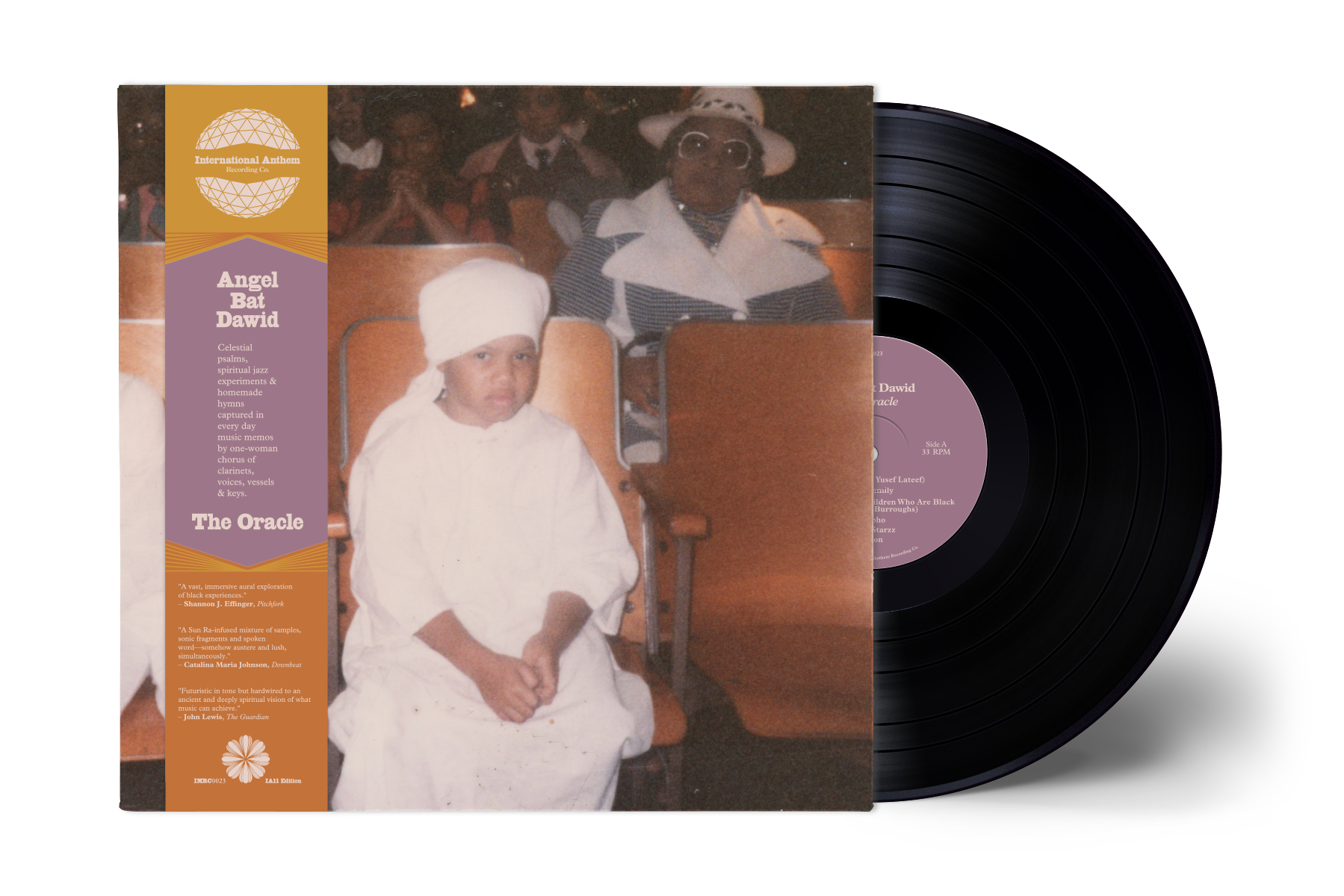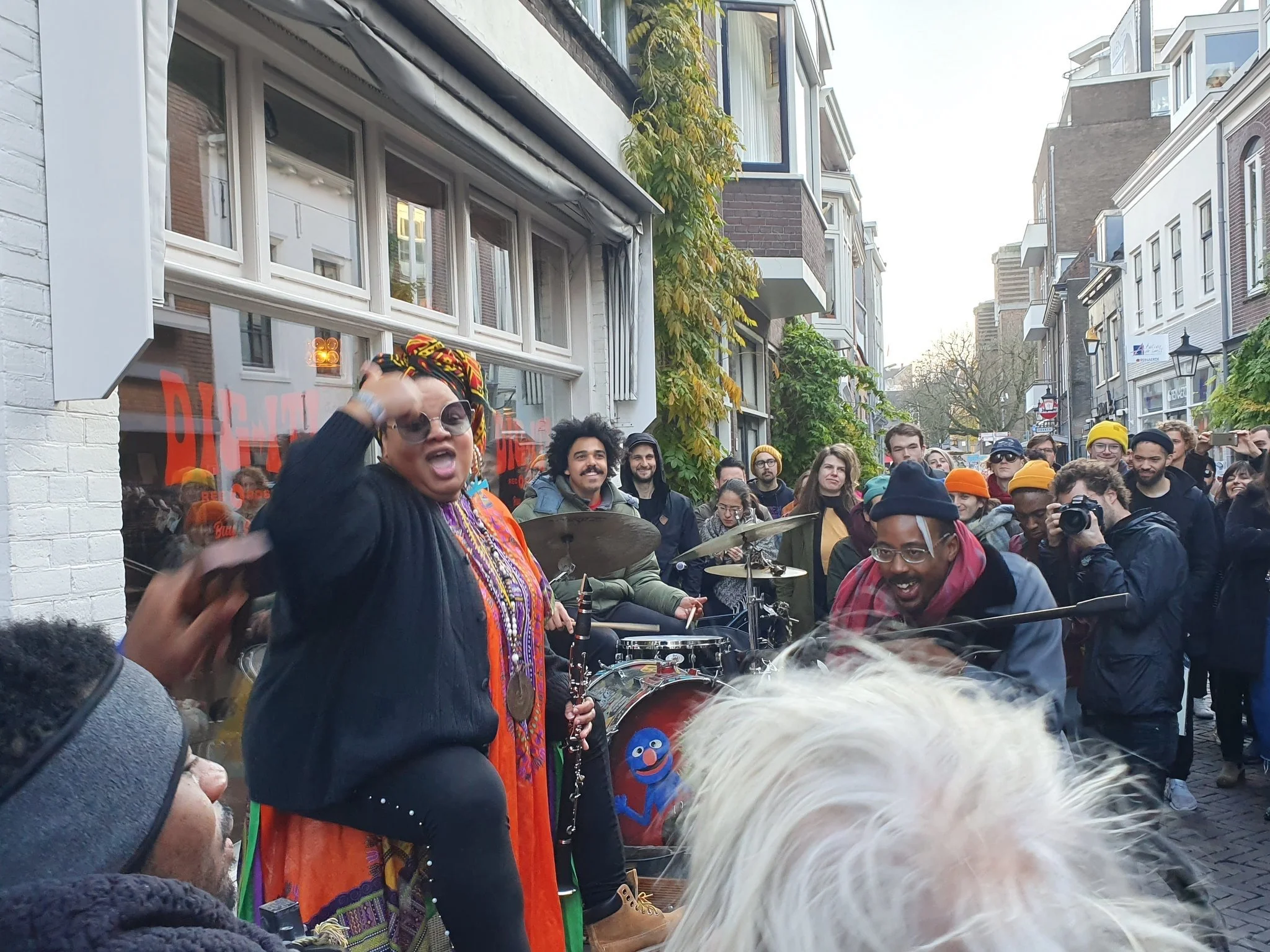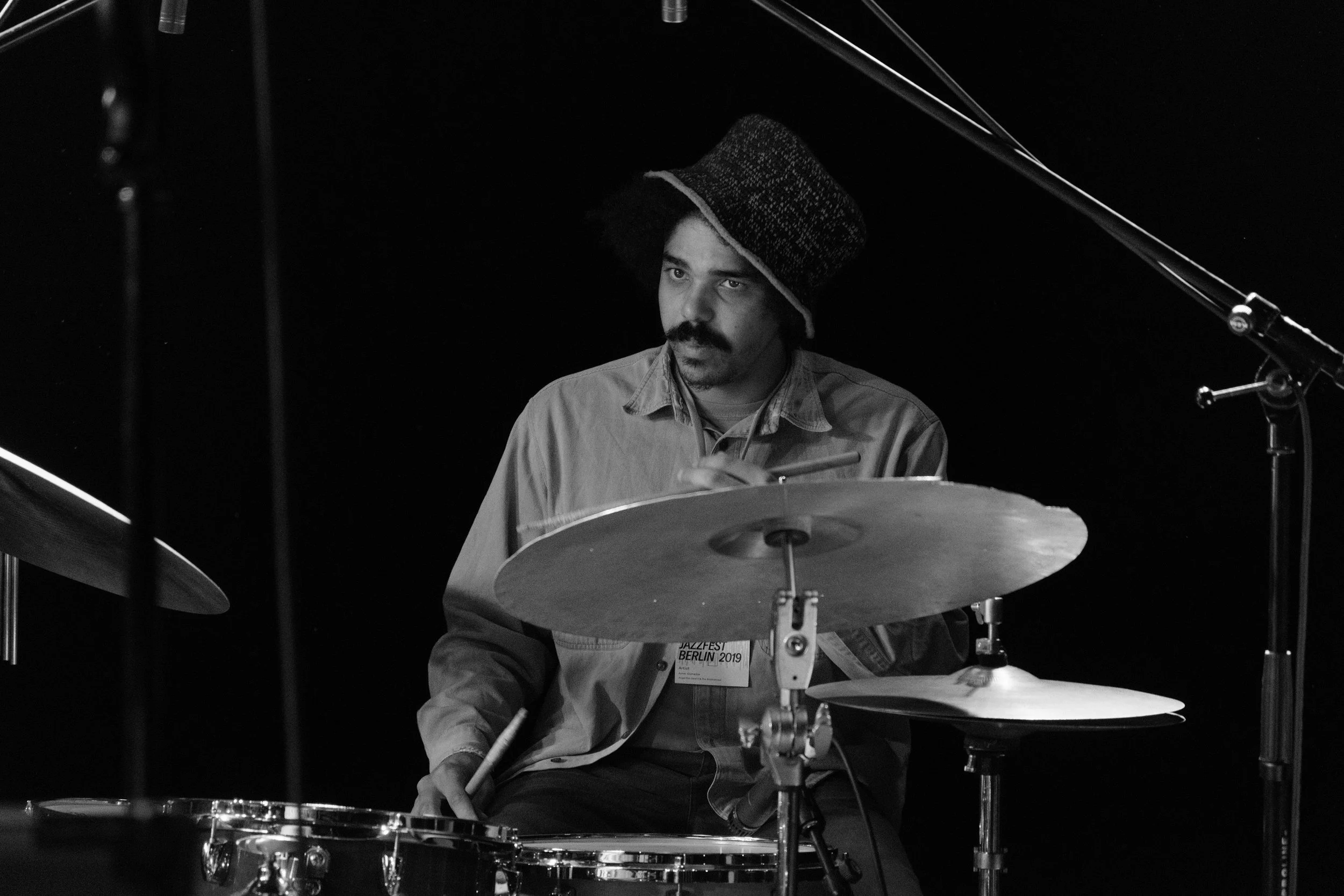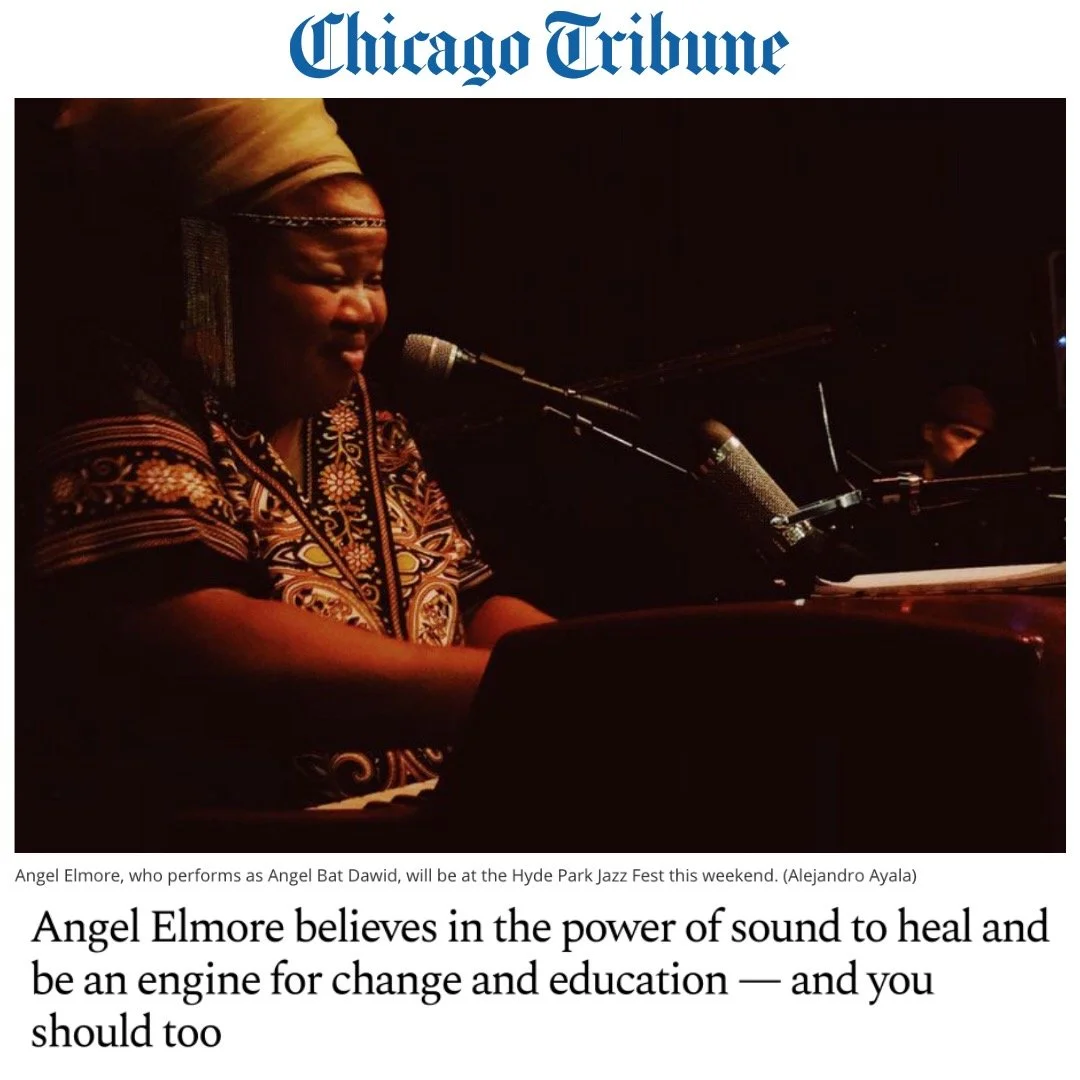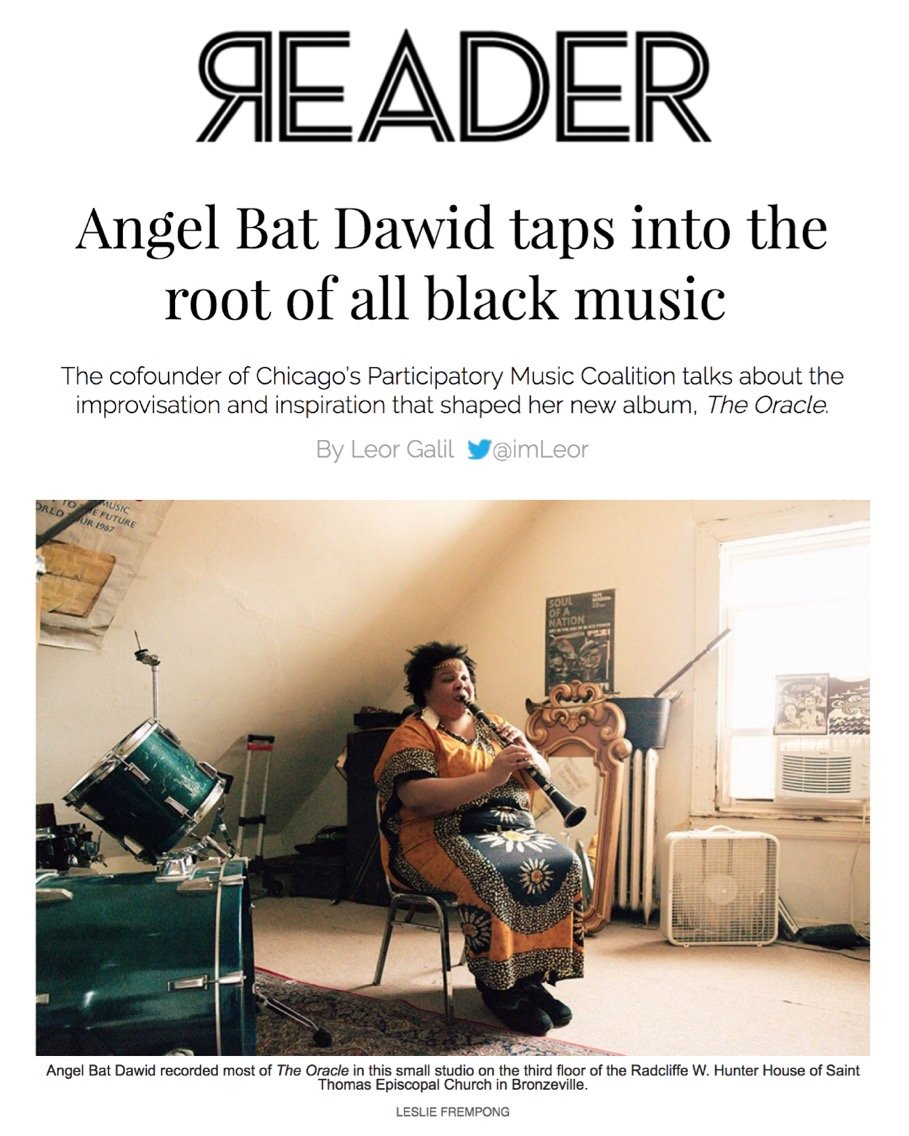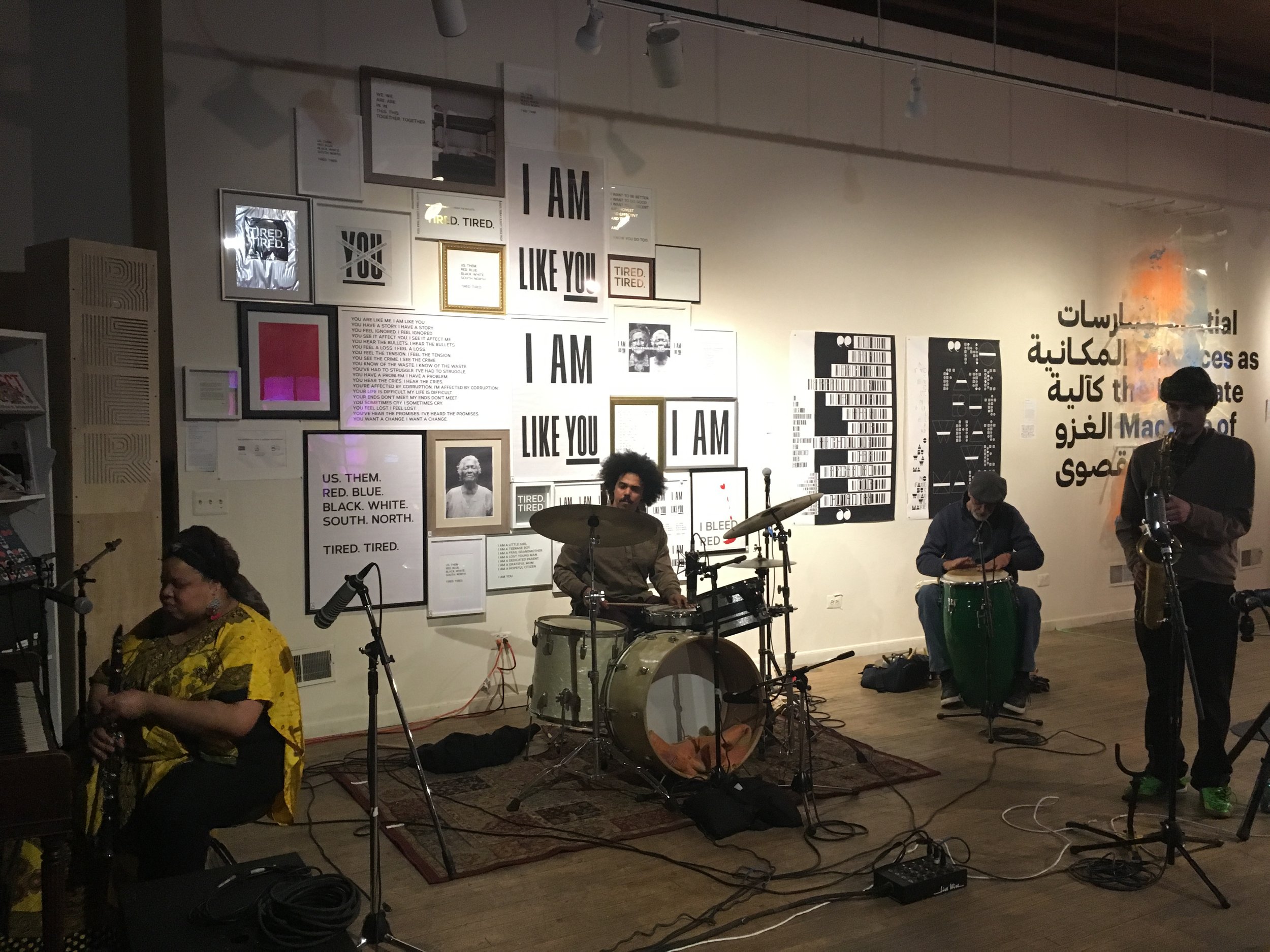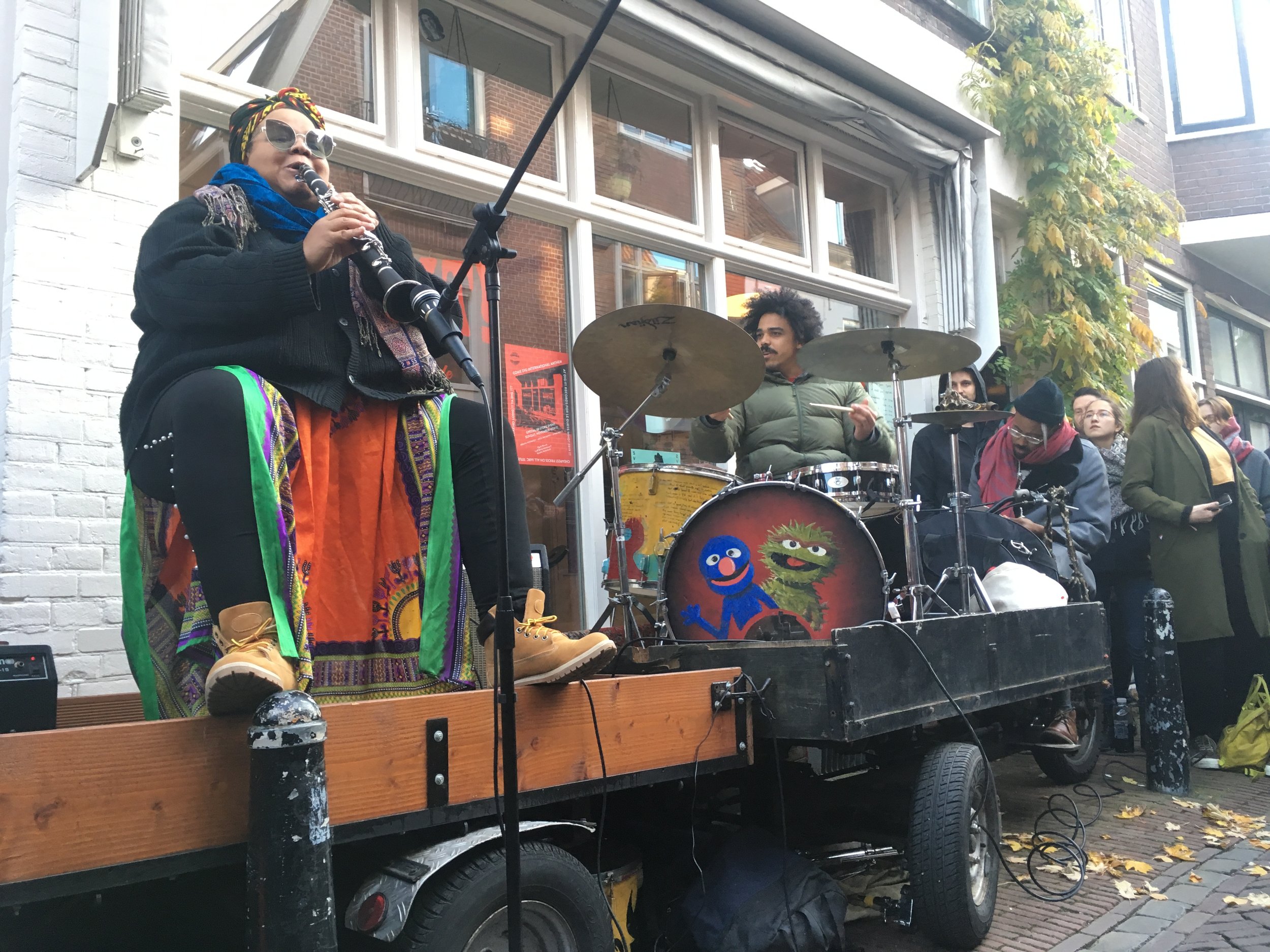International Anthem
The Eleventh Year
Angel Bat Dawid
The Oracle
IA11 Edition
Angel Bat Dawid’s International Anthem debut The Oracle introduced her multifaceted voice to the world. The response to its modest, initial cassette/digital release in January of 2019 was immediate, and immense. Within a month of its announcement, Dawid was being featured on magazine covers and receiving offers from international festivals; and her subsequent activity marked the beginning of an epic run of creative output (including her critically-lauded 2020 LIVE album with Tha Brothahood, the same year's EP Transition East, 2021's Hush Harbor Mixtape Vol. 1 Doxology, and the sprawling opus Requiem for Jazz, released in 2023) that continues through the present moment (hear: Journey to Nabta Playa, her recently-released collaboration with Naima Nefertari).
The collection of compositions on The Oracle present a deep blend of powerful and emotive songs alongside heavy and free improvisation. In true DIY fashion, with pure presence and a spirit of creative abandon, Dawid recorded and mixed the album using only her cell phone, entirely. "Angel's fieldnote approach affirms that the everyday remains a legitimate site of creative production," says percussionist, collaborator, and IARC labelmate Asher Gamedze in his liner notes for the album's IA11 Edition.
Gamedze – the only other musician to appear on The Oracle besides Dawid, who constructed most of the album's tracks by layering, overdubbing, and arranging lo-fi symphonies of her own voice, wind instruments, percussions, and keyboards – waxes extensively about Dawid's significance in his notes, calling her "a living exemplar and extension of the spacious sonic horizons opened by the likes of the AACM and their refusal of any limitations on their creative vision and the destruction of the demarcation between composer and improviser."
Revisiting The Oracle, it's abundantly clear that it was Dawid’s artistic vision and compositional skill that pushed the scope of her explorations so far. It’s how, despite their sonic contrast, the layered delay-drenched clarinet improvisations of “Black Family” or “Impepho” sit nicely with the unadorned fly-on-the-wall majesty of “London” or the nearly sidelong freedom of “Capetown” (which documents her first-time meeting with Gamedze, at his home in South Africa). The laid-back minor key gospel-folk of Dawid’s vocal tunes tie The Oracle together and sit similarly comfortable within the sides of the record.
Gamedze gets to the essence when he writes: "The album's profundity perhaps lies in its everydayness. Its beauty is in the worlds and work which are the music's root. What I do know is that it is a joy that this album exists. An instant classic with anthems ancient to the future. A totally idiosyncratic and grounded orientation to technology and production. A refusal of the lines between composition and improvisation. A multi-layered collage of history, struggle, organising and travel, both physical and metaphysical."
The IA11 Edition vinyl LP features our IARC 2025 obi strip, plus a new 8-page 11x11" insert booklet with unpublished photos and new liner notes by Asher Gamedze.
Out August 12, 2025
Available on LP/Digital via our Bandcamp page
-
All instruments & voices by Angel Bat Dawid
except drums on "Cape Town" by Asher Gamedze.Recorded & Mixed by Angel Bat Dawid.
Audio Serviced by David Allen.Cover Photo by Grandpa Rev. AJ Elmore Sr.
Info on digital-only bonus tracks:
"SPACE323 ATL (Doc. Calico’s Solar Return)"
- Live @ Space 323 Quantum Jazz Space Jam Atlanta, Ga. 04/19/2025"Eric Dolphy’s Synthetic Formations (Given to Yusef Lateef by Eric Dolphy in 1961)"
- Composed, recorded, performed, arranged and mixed for clarinet & electronics by Angel Bat Dawid using Eric Dolphy’s Synthetic Formations from Yusef Lateef's Repository of Scales & Melodic Patterns."pickpocket"
- Composition, mix, all instruments and voice by Asher Gamedze. Recorded and mixed in THE LAB."Proverbs 30:4 מִ֤יעָלָֽה־שָׁמַ֨יִם ׀"
- Composed & Arranged by Angel Bat Dawid and her Father Elder Dawid Ben Dawid feat. Vandy Harris (AACM/rest in peace) on saxophone, Uncle Percy Metcalf on Vocals, Eddie Wade (rest in peace) on Guitar, as well as legacy Chicago session musicians.
The Oracle hips us
to the real work
Notes by Asher Gamedze
Angel and Asher going in, with Deacon Otis Cooke (bottom left) and Viktor Le Givens (right), on a stage made of opposing bakfiets outside of Dig It Records in Utrecht, NL, November 2019. Photo by Zach Long.
Asher Gamedze on drums, with Angel Bat Dawid & Tha Brothahood, Berlin, 2019. Photo by Cristina Marx.
"Take care of the music and the music will take care of you" - a story-lesson that Angel often returns to. It dates back to when she first met Muhal Richard Abrams, one of the founders of the Association for the Advancement of Creative Musicians (AACM). Muhal's maxim has almost become lore in Angel's life. It’s what she lives by.
It’s a great privilege and excitement for me to have been invited by Angel and International Anthem to write notes for this reissue of The Oracle. And now that I think about it, it’s interesting that there weren’t any written for the original cut. Six years on from its initial release in 2019, so much else has been written about this wonderful album, and the reverberations of the music are still echoing far and wide.
The question of what to write when so much has been said...?
Angel herself, since The Orcale's release, has worked with so many other artists and bands including Damon Locks' Black Monument Ensemble, Lonnie Holley, Naima Nefertari, Moor Mother, Dumama and Kechou, Sons of Kemet and many many more. Her credits on these collaborations span the range of production, performance (voice, clarinet, piano, etc.), composition, arrangement, lyric-writing as well as the unnamed spiritual, creative and intellectual work that takes place both between and beyond these supposedly discreet practices. She has also, remarkably, made a stack of incredible records of her own: 2020's LIVE with Tha Brothahood and Transition East in the same year, Hush Harbor Mixtape Vol. 1 Doxology (2021), and the opus Requiem for Jazz (2023).
She and her prolific work have received rave reviews, deserved recognition and critical acclaim. From being selected as New York City Winter Jazzfest's 2022 "Artist in Residence," to receiving a commission from the Art Institute of Chicago for which she developed Peace: A Suite for Skylanding. From composing and scoring season two of the series "Random Acts of Flyness," and getting dubbed (by Pitchfork) as one of "the artists shaping where music will go from here." All of this work is testament to the fact that Angel is most definitely taking care of the music. She is a living exemplar and extension of the spacious sonic horizons opened by the likes of the AACM and their refusal of any limitations on their creative vision and the destruction of the demarcation between composer and improviser.
In many senses, The Oracle inaugurated this period of intense productivity and recognition of Angel's exemplary work. Part of the album's historical significance is undoubtedly within this trajectory of hers (as an artist). However, while it announced Angel's brilliance as a composer and an improviser, in another sense, The Oracle merely made visible to a wider audience what she was already doing and had already been involved in.
More profoundly than all the records and the accolades, Angel has continued spending time doing the work in which the totality of her existence and practice as a musician is rooted. Something that I have always respected and admired about Angel is the fact that underlying the extensive recording and collaborating, the gigging, international touring and all the public-facing activities of her life as an artist, is a committed life in community work. This work is the basis of her life as an artist. These are practices not oriented toward the industry’s trendy hype and its production of abstract value, but to building and sustaining black social life. If you know Angel, you know that this work is her heart. It’s completely fundamental to her orientation, her music, her performance, the traditions she comes from, as well as to The Oracle and its many afterlives and extensions.
Dr Margaret Burroughs' life and work has been somewhat of a northstar(zzzzz) for Angel. Amongst a lifetime of major contributions, Burroughs founded two Chicago institutions - the DuSable Museum of African American History and the South Side Community Arts Center. She also wrote a poem titled What Shall I Tell My Children Who Are Black? - part of her broader cultural and artistic focus on, and love for children in the black community. Angel always says: "we got to think about the babies," and it’s this kindred quest that found expression in her song which borrows the title of the Burroughs poem. The haunting ballad is a love for the kids, a sympathy with their lives, an empathy with the woes of black life and a commitment to a positive involvement in their development.
"What Shall I Tell My Children Who Are Black" is even more than a song title, a homage to Burroughs and an ode to the babies, it’s a clue to what Angel would call the real work.
Angel works in collaboration with organisations like Music Moves Chicago, institutions like Old Town School of Folk Music, and bandmates and friends to develop and teach music education courses for Chicago's South Side youth. These programmes take place in community centres, in the street, local schools and juvenile detention centres - wherever the youth are at. Always in these programmes these youth are participants - they are encouraged to compose, experiment and, ultimately, are given the space to find themselves in this music. This expansive approach to arts education - encompassing spiritual practice, history, dancing, music theories and more - allows for travel - to other times and spaces through different rhythms and scales.
Like this portal-opening education, and because The Oracle's root is this work, it takes us beyond itself. It refuses the confines of "the album" and moves toward opening a broader world, of Burroughs, of ancestors, of community work, of memory and the work of those who have passed on. Because the album is not just the album, the question of what to write still looms large and it takes us, again, beyond itself to the real work.
Angel's already-mentioned project Transition East, one of The Oracle's afterlives, hips us to Eliel Sherman Storey's life (peace Eliel, go well Eliel!), his intention and his work. About the South Side independent cultural centre which he ran since the early 1990s until his passing and transcendence a few years ago, Eliel said: "Transition East is a memory we decided was valuable enough to resurrect for the Community." Like Muhal's maxim, and Burroughs' books, this elder's orientation captures a motive principle of Angel's approach. This orientation is manifest in real, ongoing relationships and a practice inscribed in the city. Through working with Eliel - a trusted and supportive elder - Transition East became a space that Angel continued to invest in and put a lot of energy into. She organised community events there, like 2019's "Duetzzz" which I was privileged to participate in, her band Sistazz of the Nitty Gritty used to support the space and rehearse in it, and whenever anyone was looking for a space to perform or record, she would always try to put them onto it. Why? Because it was "a memory we decided was valuable enough to resurrect for the Community."
Angel Bat Dawid (left), Asher Gamedze (center left), Sura Dupart (center right), and Xristian Espinoza (far right), making sound at Co-Prosperity, Chicago, 2019. Photo by Scott McNiece.
Like many folks, I have a very deep relationship with this album and the music on it. I’ve had the privilege and opportunity to play much of it – both in Chicago and across much of western Europe – as a member of Angel’s band Tha Brothahood. And I have the singular honour of being the only other musician to appear on The Oracle. "Capetown" was recorded in my bedroom merely a few hours after my first meeting with Angel. For both of us, having reminisced about this day many a time, this was a significant occasion.
We had been connected over email by a mutual friend in London, Teju Adeleye, and we linked up when Angel came to visit South Africa. We met at Ganesh, a neighbourhood restaurant/bar in the suburb of Observatory where I lived at the time. Fairly soon into our hang it was clear that Angel and I both shared a love for black creative music and, perhaps to her surprise at the time, for the Chicago tradition a la Art Ensemble et al.
Seeing that she had her clarinet with her, I invited her around to my place to play some music. We walked over to my place together, imbibed some herbs with my housemate and friend Ru Slayen (percussionist on my Black Lungs album, Constitution). We listened to the first side of Art Ensemble's Nice Guys before entering The Lab (my bedroom), where we sat down at our instruments. Unbeknownst to me, Angel hit record...
“Touch whatever I choose. Smell. Eat. Love. Choose whatever I choose. Do. Say. Be whatever I choose to be. The choice is mine.”
I always thought it was so bold and badass that Angel put “Capetown” on her album. Like the rest of The Oracle, she recorded it on her phone. In the contemporary music industry where professional musicians often seek out the most sterile of conditions in which to record, Angel's fieldnote approach affirms that the everyday remains a legitimate site of creative production... and the question of what to write remains.
...
How to note the lines of The Oracle when it seems to resist being written about as a thing (as if the songs break out of themselves, noting and pointing toward the context that created them)? The album's profundity perhaps lies in its everydayness. Its beauty is in the worlds and work which are the music's root. What I do know is that it is a joy that this album exists. An instant classic with anthems ancient to the future. A totally idiosyncratic and grounded orientation to technology and production. A refusal of the lines between composition and improvisation. A multi-layered collage of history, struggle, organising and travel, both physical and metaphysical.
Long live The Oracle!
Long live the real work!
Photo by Zach Long.
Photo by Pascal Gambarte
Angel Bat Dawid is a Black American Composer, Improviser, Clarinetist, Pianist, Vocalist, Educator and DJ. In 2019 she released her debut album The Oracle with Chicago label International Anthem Recording Co.. Recorded using only her cell phone in various locations, the album received wide-spread critical-acclaim with Pitchfork declaring it, “a vibrant, spiritual, free-jazz document of black life as it stands today.” Known for her prowess as a bandleader and performer, Angel has composed and performed several live pieces including her latest release “Requiem for Jazz" which was originally performed at the Hyde Park Jazz Festival in 2019, and “Peace: A Suite for Skylanding,” commissioned by the Art Institute of Chicago for Yoko Ono’s outdoor Skylanding installation.
Angel Bat Dawid
About
International Anthem
The Eleventh Year
On December 2nd, 2024, we marked the ten-year anniversary of our first release.
With a full decade under our belt – ten years of commitment to a growing community of artists, and our original mission statement ("to vitalize demand for boundary defying music," among other things) – we've spent a lot of time thinking about how we'd like to celebrate this milestone. What we keep coming back to is: desire to use this opportunity to revisit and revivify music and memories from our first decade; but keeping true to our ethos of always looking forward, all the way.
In that spirit, across 2025, we'll be rolling out a series of releases and events under the IA11 banner. Celebrating our eleventh year. Doing our best to retell essential, foundational stories from our past, while keeping our hearts and minds fixed on the present. Trying to establish new standards that can help carry our mission through another decade of work – and hopefully more.
Stay tuned for releases and news.



